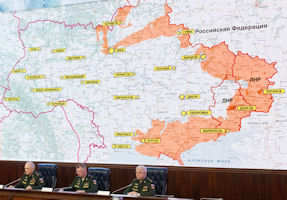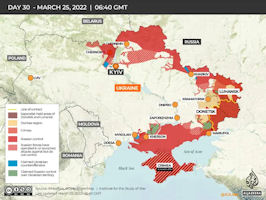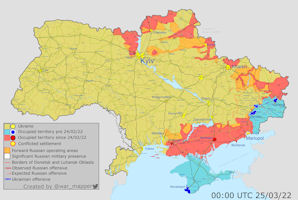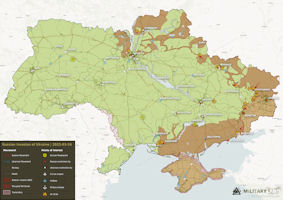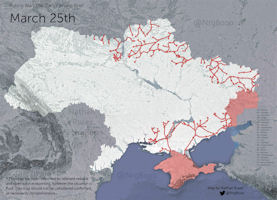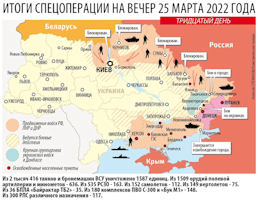Russo-Ukraine War - 25 March 2022
| Su | M | Tu | W | Th | F | Sa |
|---|---|---|---|---|---|---|
| 1 | 2 | 3 | 4 | 5 | ||
| 6 | 7 | 8 | 9 | 10 | 11 | 12 |
| 13 | 14 | 15 | 16 | 17 | 18 | 19 |
| 20 | 21 | 22 | 23 | 24 | 25 | 26 |
| 27 | 28 | 29 | 30 | 31 |
On 24 February 2022, Ukraine was suddenly and deliberately attacked by land, naval and air forces of Russia, igniting the largest European war since the Great Patriotic War. The military buildup in preceeding months makes it obvious that the unprovoked and dastardly Russian attack was deliberately planned long in advance. During the intervening time, the Russian government had deliberately sought to deceive the world by false statements and expressions of hope for continued peace.
"To initiate a war of aggression... is not only an international crime; it is the supreme international crime differing only from other war crimes in that it contains within itself the accumulated evil of the whole." [Judgment of the International Military Tribunal]
Russian President Vladimir Putin announced a "special military operation" in Ukraine in response to the appeal of the leaders of the "Donbass republics" for help. That attack is a blatant violation of the territorial integrity, sovereignty and independence of Ukraine. Putin stressed that Moscow's goal is the demilitarization and denazification of the country.
Mariupol officials, citing witnesses, say about 300 people were killed when a theatre in the besieged southeastern port city was bombed by Russian forces on March 16. There were about 1000 people sheltering when Russia dropped bombs on it, despite a clearly visible and huge sign 'Children' on the pavement outside.
Russia’s military had considered two options for its operation in Ukraine, one confined to the Donbas and the other on the whole territory of Ukraine, before opting for the latter, according to Sergei Rudskoi, head of the Russian General Staff’s Main Operational Directorate.
"At the same time, two options were possible. The first one was to confine ourselves to the territory of the DPR and LPR within the administrative borders of the Donetsk and Lugansk regions, which is enshrined in the constitutions of the republics. But then we would be faced with the constant replenishment by the Ukrainian authorities of the group involved in the so-called operation of the united strength," he said.
According to the general, therefore, the second option was chosen, which provides for actions throughout the territory of Ukraine with the implementation of measures for its demilitarization and denazification. The RF Armed Forces will continue the planned conduct of a special military operation in Ukraine until the tasks set by the Supreme Commander-in-Chief, President Vladimir Putin, are fully completed, Rudskoy said.
Russia said the first phase of its “military operation” in Ukraine is mostly complete and that it will now focus on completely “liberating” eastern Ukraine’s Donbas region. The Russian defence ministry said Russian-backed separatists now controlled 93 percent of Ukraine’s Luhansk region and 54 percent of the Donetsk region – the two areas that jointly make up the Donbas.
“The combat potential of the Armed Forces of Ukraine has been considerably reduced, which … makes it possible to focus our core efforts on achieving the main goal, the liberation of Donbas,” Rudskoi said. The defence ministry added that it did not rule out storming Ukrainian cities that had been blockaded and said that Russia would react immediately to any attempt to close the airspace over Ukraine – something Kyiv has asked NATO to do, but NATO has resisted.
"The public and individual experts are wondering what we are doing in the area of the blockaded Ukrainian cities. <...> Initially, we did not plan to storm them in order to prevent destruction and minimize losses among personnel and civilians," Rudskoy recalled. At the same time, he noted, such a possibility is not ruled out. Russian weapons, he said, showed "high accuracy, reliability, and the possibility of operational use."
Russia claimed that of the 2,416 tanks and armored vehicles of the Armed Forces of Ukraine, 1,587 units were destroyed. Out of 1509 field artillery guns and mortars - 636. Out of 535 MLRS - 163. Out of 152 aircraft - 112. Out of 149 helicopters - 75. Out of 36 Bayraktar TB2 UAVs - 35. Out of 180 S-300 and Buk M1 air defense systems. - 148. Of the 300 radars for various purposes - 117.
The Russian military attacked 16 main Ukrainian military airfields and destroyed 39 storage bases and arsenals, where up to 70% of military equipment, materiel and fuel were located, as well as over a million tons of ammunition. 30 key enterprises of the military-industrial complex were hit by high-precision weapons. During the month, a significant part of the territory of the Donetsk and Lugansk people's republics was liberated - 54% and 93%, respectively, 276 settlements came under the control of the people's militia of the republics.
Since the beginning of the operation, Western countries have supplied Ukraine with more than 100 artillery pieces, almost 900 man-portable air defense systems and 3,800 anti-tank weapons. "We consider it a huge mistake to supply arms to Kiev by Western countries. This prolongs the conflict, increases the number of victims and cannot affect the outcome of the operation. The real purpose of such supplies is not to support Ukraine, but to draw it into a long military conflict" to the last Ukrainian," Rudskoy said.
Rudskoy warned that Russia would "not leave unattended" any attempts to supply Kiev with new aircraft and air defence systems, and warned NATO not to implement a no-fly zone. "Individual member states of the North Atlantic alliance are proposing the closure of the airspace over Ukraine. I draw your attention to the fact that the armed forces of the Russian Federation will immediately respond to such attempts in an appropriate manner," Rudskoy said.
Ukraine has told the US that it urgently needs to be supplied with 500 Javelin anti-tank missiles and 500 Stinger air defense missiles per day, CNN reported, citing a document presented to US lawmakers. Western countries have been sending weapons and military gear to Kiev but President Volodymyr Zelensky said it was not enough to fend off the Russian attack that was launched a month ago. Reuters reported that the White House began consultations on delivering anti-ship missiles to Ukraine. “There may be some technical challenges with making that happen but that is something that we are consulting with allies and starting to work on,” an official source told Reuters.
Ukrainian forces have re-occupied towns and defensive positions up to 35 kilometers east of Kyiv, helped by Russian forces falling back on overextended supply lines, Britain's defence ministry said. A senior Pentagon official said that Russia was beginning to call upon reinforcements from Georgia as Moscow struggles in its bid for a swift takeover of neighboring Ukraine. “I will say that we’ve seen our first indication that they [Russia] are trying to send in some reinforcements from Georgia. So, we have seen the movement of some number of troops from Georgia,” a senior US defense official told reporters.
Russia had launched some 1,200 cruise missiles since its invasion began, but 59 percent of them did not explode, were shot down or missed, Ukraine’s General Staff of the Armed Forces said. “Others were either shot down by air defence forces, or hit wrong targets – mountains, forests, rivers,” it added. “They have imprecise missiles and crooked hands.” Under-Secretary of Defense for Policy Colin Kahl said earlier that Moscow was running out of precision-guided munitions and was increasingly likely to rely on other weapons.
Three US officials told the Reuters news agency that Russia was suffering failure rates as high as 60 percent for some of the precision-guided missiles it is using to attack Ukraine. Reuters said the US officials did not provide evidence to support the assessment and did not disclose what precisely was driving high missile failure rates. If true, the agency said, it could help explain why Russia has failed to achieve what most could consider basic objectives since its invasion a month ago, such as neutralizing Ukraine’s air force, despite the apparent strength of its military against Ukraine’s smaller armed forces.
In the past 24 hours, Ukrainian forces killed some 200 Russian servicemen and repelled nine attacks, Ukraine’s General Staff of Armed Forces has said. It also said on Facebook that 12 tanks, 20 armoured vehicles, nine artillery systems, three planes and three drones had been destroyed.
Ukrainian Foreign Minister Dmytro Kuleba says negotiations with Russia aimed at ending the conflict are “very difficult” and vowed Kyiv would not back down on its demands. “The Ukrainian delegation has taken a strong position and does not relinquish its demands. We insist, first of all, on a ceasefire, security guarantees, and [the] territorial integrity of Ukraine,” Kuleba said. Russian negotiator Vladimir Medinsky said the two sides were making little progress on key issues. Medinsky also said Moscow believed Kyiv was trying to stretch out the negotiations.
The US and EU announced a new deal on liquefied natural gas (LNG) aimed at reducing Europe’s reliance on Russian energy imports. The agreement, unveiled by Biden and European Commission President Ursula von der Leyen at a news conference in Brussels, will see the US supply the bloc with at least 15 billion additional cubic meters of the fuel this year. “This will replace the LNG supply we currently receive from Russia,” von der Leyen said. The EU in early March announced plans to slash its dependence on Russian gas by two-thirds in 2022.
“We expect near-term measures to support European LNG imports to rely on the reallocation of existing supply,” analysts at Goldman Sachs said in a report, noting “such a relocation to Europe is already happening” because European gas prices have in recent months mostly been the highest in the world.
Germany’s economy ministry wants to halve the country’s dependence on Russian oil by the summer and have no Russian hard coal imports by the autumn, the country’s Der Spiegel magazine reported, citing a ministry memo. “By the middle of the year, Russian oil imports to Germany are expected to be halved,” Spiegel quoted the memo as reading. “By the end of the year, we aim to be almost independent. By autumn, Germany can be independent of Russian coal.”
Western powers took new action aimed at destabilising Russia’s sanctions-hit economy. The US and its allies announced they were blocking financial transactions involving the Russian central bank’s international reserves of gold. The restrictions are designed to limit Russia’s ability to use gold to circumvent punishing Western sanctions. The government of President Vladimir Putin has spent years building its reserves and currently has the fifth largest stockpile of gold in the world.
Brazil is "clearly opposed" to barring Russia from the G20, the foreign minister said, as the US led a push to exclude Moscow from the group over its invasion of Ukraine. "We've seen initiatives emerge in various international organisations ... to expel or suspend Russia. Brazil is clearly opposed to those initiatives, in line with our traditional position in favour of multilateralism and international law," Foreign Minister Carlos Franca told a Senate session.
Some 3.7 million people have fled Ukraine since Russia's invasion a month ago, the UN said. The UN refugee agency, UNHCR, said 3,725,806 Ukrainians had fled the country -- an increase of 50,854 from the previous day's figure. Around 90 percent of them are women and children, it added. 2.2 million refugees have fled for neighboring Poland while more than half a million have made it to Romania. A senior Russian defence ministry official, Mikhail Mizintsev, said 419,736 civilians had been evacuated to Russia from the separatist eastern Donetsk and Luhansk regions, as well as the rest of Ukraine. Of these, more than 88,000 were children, he added.
In Sevastopol , the death of the commander of the 810th Separate Guards Marine Brigade of the Black Sea Fleet of Russia, Alexei Sharov , was confirmed in the battles for Mariupol and reported the death of two more Russian soldiers from this brigade. The Russian mayor Mikhail Razvozhaev wrote about this in his telegram channel. Russia’s army updated its troop death toll, saying 1,351 soldiers have been killed and 3,825 others wounded since the start of its offensive in Ukraine. The new toll, announced at a Moscow briefing delivered by senior military officials, came several weeks after Moscow gave its first assessment of losses in the conflict on March 2. At the time, Russia put the number of its forces killed at 498. Kyiv says more than 16,000 Russian troops have been killed, while NATO officials said they believed the death toll on the Russian side amounts to between 7,000-15,000 personnel.
The "irretrievable losses" [presumably KIA] of the Ukrainian armed forces and the National Guard since the beginning of the operation exceeded 14,000 people, in total they lost about 30,000 soldiers and officers [presumably WIA, POA, AWOL, etc] Sergei Rudskoy, First Deputy Chief of the General Staff said. This is approximately 11.5% of their composition.But these numbers don't seem consistent with the typical 1 KIA / 3 WIA numbers. The Ukrainian air force and air defense system "are almost completely destroyed," and the country's naval forces "ceased to exist," Rudskoy said.
|
NEWSLETTER
|
| Join the GlobalSecurity.org mailing list |
|
|
|


